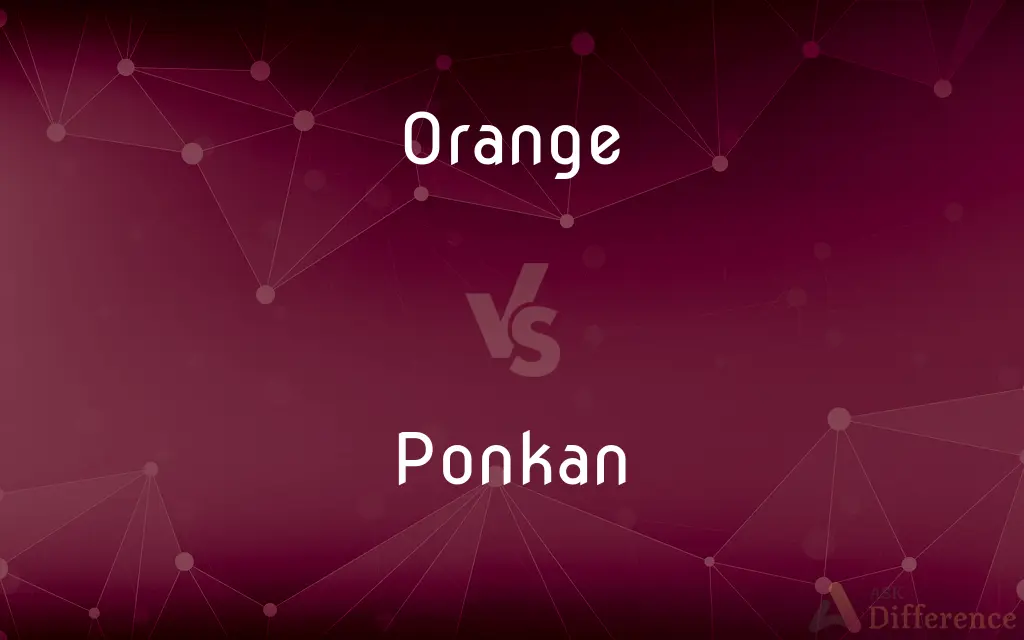Orange vs. Ponkan — What's the Difference?
Edited by Tayyaba Rehman — By Maham Liaqat — Updated on March 1, 2024
Orange refers to a range of citrus fruits known for their bright color and acidic taste, while Ponkan is a specific type of sweet, large, and easy to peel citrus fruit, known as type of mandarin orange, notable for its mild flavor and high juice content.

Difference Between Orange and Ponkan
Table of Contents
ADVERTISEMENT
Key Differences
Oranges and Ponkans are both popular citrus fruits, but they differ significantly in taste, appearance, and usage. Oranges, with their vibrant color and tangy flavor, are a staple in many diets around the world. They come in various types, including navel, Valencia, and each with distinct characteristics. Ponkan, on the other hand, is a type of mandarin orange, known scientifically as Citrus reticulata. Ponkans are larger than most mandarins and are prized for their exceptionally sweet flavor and soft, easy-to-peel skin. They have a high juice content and contain numerous seeds.
Oranges are celebrated for their versatility, being consumed both fresh and in juice form, and are a key ingredient in many culinary dishes. They are also packed with vitamin C and beneficial nutrients, making them a healthy dietary choice. Originating from China, Ponkans are highly regarded in many Asian cuisines and are often eaten fresh or used in desserts. While not as widely available globally as other oranges, their popularity is growing due to their unique flavor profile and nutritional benefits.
The main differences between the two lie in their taste, texture, and culinary uses. Oranges, with their broader category, offer a range of flavors from sweet to sour, making them suitable for a wide variety of dishes and products. Ponkans, with their sweeter and milder taste, are more commonly consumed fresh, offering a different experience in terms of flavor and ease of eating.
Both oranges and Ponkans offer high levels of vitamin C, though the exact nutritional content can vary between different types of oranges. Ponkans tend to be a bit higher in sugars, given their sweeter taste, but both are considered healthy options.
Oranges present a broad category of citrus with diverse tastes and uses, Ponkans offer a specific taste experience favored in certain culinary traditions, especially for those preferring a sweeter, less acidic fruit.
ADVERTISEMENT
Comparison Chart
Type
Broad category of citrus fruits.
Specific type of mandarin orange.
Taste
Ranges from sweet to sour.
Sweeter and milder than most oranges.
Size
Varies, generally medium-sized.
Larger than most mandarins.
Peel
Can be thick and sometimes difficult to peel.
Soft and easy to peel.
Seeds
Seedless varieties available.
Contains numerous seeds.
Juice Content
High, varies among types.
Very high.
Culinary Uses
Versatile, used in both sweet and savory dishes, as well as beverages.
Primarily eaten fresh or used in desserts.
Nutrition
High in vitamin C, varying levels of acidity and sugars.
High in vitamin C, generally sweeter with more sugars.
Origin
Widely cultivated around the world.
Originated in China, popular in Asia.
Compare with Definitions
Orange
A citrus fruit known for its tangy taste.
The Valencia orange is favored for juicing.
Ponkan
Contains seeds and has high juice content.
Ponkans are juicier than many other citrus fruits.
Orange
Rich in vitamin C and nutrients.
Eating an orange a day can help boost your immune system.
Ponkan
Noted for its large size and easy-to-peel skin.
Ponkans are often given as gifts due to their appealing appearance.
Orange
Versatile in flavor profile.
Some oranges are sweet, while others are more acidic.
Ponkan
Primarily consumed fresh.
Ponkans are a refreshing snack on their own.
Orange
Comes in various types with different characteristics.
Oranges are noted for their deep red flesh.
Ponkan
Originates from China and is popular in Asian cuisine.
Ponkan segments are a common addition to fruit salads in Asia.
Orange
Widely used in culinary applications.
Orange zest adds a vibrant flavor to baked goods.
Ponkan
A type of mandarin orange with a sweet flavor.
Ponkans are a popular treat during the Chinese New Year.
Orange
Any of several evergreen trees of the genus Citrus of Southeast Asia, widely cultivated in warm regions and having fragrant white flowers and round fruit with a yellowish or reddish rind and a sectioned, pulpy interior, especially the sweet orange and the bitter orange.
Ponkan
Ponkan (Chinese: 椪柑); Citrus poonensis; "Chinese Honey Orange") is a high-yield sweet Citrus cultivar with large fruits in the size of an orange. It is a citrus hybrid (mandarin × pomelo), though it was once thought to be a pure mandarin.
Orange
The fruit of any of these trees, having a sweetish, acidic juice.
Ponkan
A sweet, round citrus fruit which is a hybrid of a mandarin and a pomelo Citrus poonensis.
Orange
Any of several similar plants, such as the Osage orange and the mock orange.
Orange
(countable) The fruit of the orange tree; a citrus fruit with a slightly sour flavour.
Orange
The colour of a ripe fruit of an orange tree, midway between red and yellow.
Orange
The fruit of a tree of the genus Citrus (Citrus Aurantium). It is usually round, and consists of pulpy carpels, commonly ten in number, inclosed in a leathery rind, which is easily separable, and is reddish yellow when ripe.
Common Curiosities
Are Ponkans available worldwide?
Ponkans are increasingly available globally but are more commonly found in Asia.
Can Ponkans be used for juicing like oranges?
Yes, Ponkans can be used for juicing, though they contain seeds that might need to be removed.
Which has more vitamin C, an orange or a Ponkan?
Both are high in vitamin C, though the exact content can vary slightly between them.
Can I use Ponkan in recipes calling for oranges?
Yes, but expect a sweeter taste and possibly a different texture due to the higher juice content and softer peel.
Why might someone prefer a Ponkan over an orange?
Someone might prefer Ponkans for their sweeter taste, easier peel, and the novelty of trying a different type of citrus.
Which is sweeter, an orange or a Ponkan?
Ponkans are generally sweeter than most oranges.
How do I store Ponkans compared to oranges?
Both should be stored in a cool, dry place; Ponkans may have a shorter shelf life due to their softer skin.
Is there a difference in the health benefits between oranges and Ponkans?
Both offer similar health benefits, including high vitamin C content, though the sugar content may vary.
Can Ponkans be grown in the same regions as oranges?
Ponkans thrive in similar climates to oranges but may have specific cultivation requirements based on the variety.
Are there seedless Ponkans?
Ponkans typically contain seeds, unlike some orange varieties that can be seedless.
Share Your Discovery

Previous Comparison
Communication vs. Dialogue
Next Comparison
Get vs. CollectAuthor Spotlight
Written by
Maham LiaqatEdited by
Tayyaba RehmanTayyaba Rehman is a distinguished writer, currently serving as a primary contributor to askdifference.com. As a researcher in semantics and etymology, Tayyaba's passion for the complexity of languages and their distinctions has found a perfect home on the platform. Tayyaba delves into the intricacies of language, distinguishing between commonly confused words and phrases, thereby providing clarity for readers worldwide.















































